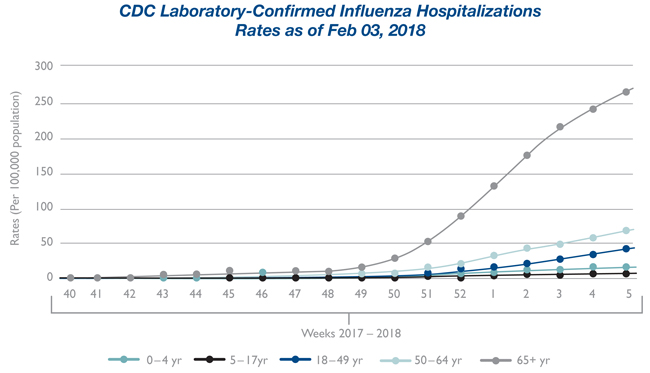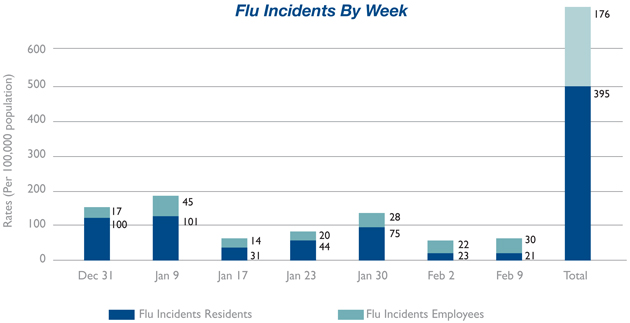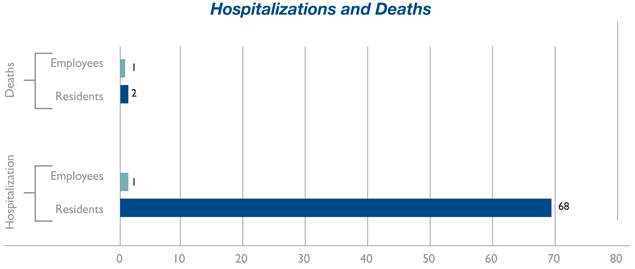Exhibit 99.1
SPECIAL ISSUE
brief

Flu Prevention and Response Planning
By Brett Lee and Colleen Honnors, RN, BSN

| © | 2018 The American Seniors Housing Association |
| | All rights reserved. The text portions of this work may not be reproduced or transmitted in any form or by any means, electronic or mechanical, including photocopying, recording, or by information storage and retrieval system without permission in writing from the publisher. |

TABLE OF CONTENTS
| | | | |
INTRODUCTION | | | 3 | |
| |
BACKGROUND | | | 3 | |
| |
FLU PREVENTION AND RESPONSE PLAN | | | 4 | |
| |
PREVENTION | | | 5 | |
| |
EDUCATION | | | 5 | |
| |
IDENTIFICATION AND CONTAINMENT | | | 6 | |
| |
ONGOING MONITORING | | | 6 | |
| |
EXPERIENCE AND LESSONS LEARNED | | | 7 | |
1

2

Flu Prevention and Response Planning
INTRODUCTION
Capital Senior Living (CSL), headquartered in Dallas, Texas, is one of the nation’s largest operators of residential communities for senior adults. Capital Senior Living operates 129 senior housing communities in geographically concentrated regions with an aggregate capacity of approximately 16,500 residents.
Like the rest of the industry, CSL experienced a significant attrition event in the wake of the devastating 2016-2017 influenza season, and was determined to undertake the company’s first national public health initiative to better protect its residents from the impact of communicable diseases going forward.
In light of the Centers for Disease Control and Prevention (CDC) health advisory on the 2017-2018 Flu epidemic, CSL launched a comprehensive prevention and response plan across its communities to combat the outbreak. Through these efforts, CSL has been able to protect its residents and employees, resulting in significant reductions in infections, hospitalizations, and deaths nationwide.
BACKGROUND
On December 27, 2017 the CDC released an Emergency Preparedness and Response Alert notifying the public about the increased influenza A(H3N2) activity and forecasting an epidemic level flu season. The flu season has proved to be particularly virulent, and those that are infected are experiencing an unusually high hospitalization and death rate — especially adults aged 65 and above.
The overall hospitalization rate was 59.9 per 100,000 persons, with the highest rate of hospitalization among adults aged³65 years (263.6 per 100,000 persons). The average resident at Capital Senior Living is83-years-old with multiple medicalco-morbidities, representing those most at risk in the nation’s population for becoming infected and requiring hospitalization. In order to prevent a widespread outbreak in its communities, CSL proactively implemented a comprehensive flu prevention and response plan to protect its residents.
3



CAPITAL SENIOR LIVING FLU PREVENTION AND RESPONSE PLAN
Under the guidance of their corporate nursing leadership, Capital Senior Living developed a comprehensive “flu kit” to be implemented in all 129 CSL communities across the country.
The intent of the campaign was to provide protection to prevent as many infections as possible for both staff and residents (through coordinated flu vaccine clinics in every community), retrain CSL staff on effective means of infection prevention (symptom surveillance, hand hygiene, etc.), provide education to staff, residents and visitors around their role in preventing an outbreak, and provide guidance on how to contain an outbreak quickly to prevent additional infections from occurring.
The flu kits were rolled out across the company in September of 2017 (in advance of the flu season), with webinar andon-site training provided by the corporate Quality Assurance Nurses toon-site staff and leadership at every CSL community. The components of the flu kit are outlined below in greater detail.
4

PREVENTION
All residents were requested to obtain “high dose” vaccinations at onsite CSL clinics, and all staff members were offered the flu shot at no cost to them. Capital Senior Living provided at least one onsite clinic at every property. Many residents elected to obtain their shots at their physicians’ offices or other locations, and this was documented by CSL staff to obtain an overall compliance rate.
Seventy-four percent of CSL residents received the flu vaccine, equating to approximately 8,400 residents. Additionally, 48 percent of all employees were vaccinated.
Individuals who opted out of vaccination were tracked by the following:
| | • | | Vaccination Declination Form that detailed the reasons for declining the vaccine |
| | • | | Most commonly cited reasons for declining the vaccine were past negative reaction to the vaccine and religious objections |
EDUCATION
The following material was provided in the Flu Kit:
| | • | | Communication guidelines to assist executive directors and wellness directors in community meetings to explain the components and benefits of the flu campaign to all staff members and residents to encourage full compliance |
| | • | | Staff education materials on how to identify flu symptoms in the senior population |
| | • | | Education on the importance of handwashing for all staff and residents |
| | • | | Informative posters on importance of flu vaccination |
| | • | | Informative posters on “Cover Your Cough” to prevent spread of infection |
| | • | | Letter template to send to each resident on the Flu Campaign, information on vaccinations and services offered by CSL, local clinics, and symptoms to report |
5


IDENTIFICATION AND CONTAINMENT
Staff members at each community were given an informative document titled, “How to Manage Confirmed Flu Outbreak”, that provided details on reporting and tracking requirements, appropriate disinfecting products and protocols, instructions on shutting down activities and dining room services, and instructions on who must wear a mask during the outbreak.
Components included:
| | • | | Flu Outbreak Tracker: Executive Directors were responsible to track and maintain updates on community-wide occurrences. Information recorded included: |
| | • | | Resident Name/ Apartment Number |
| | • | | Date of Onset & Symptoms |
| | • | | Antiviral Medication Guidelines: Staff was given information to aid in the explanation of the importance of such medication and how to be proactive in obtaining orders. Some geographic shortages of medication occurred, but this had minimal effects due to acting early and staff facilitating the residents starting medication in a timely manner. |
| | • | | Letter Template to send to each resident on the Flu Campaign, information on vaccinations and services offered by CSL, local clinics, and symptoms to report |
| | • | | Guidelines were given in terms of when to shut down public gatherings, such as group activities and public dining, in order to prevent additional infections |
ONGOING MONITORING
Nurses and caregivers in CSL communities were pivotal in every step in the Flu Campaign, leading the initiatives at the community, as well as national level, to provide guiding insights for the success of the campaign.
| | • | | Corporate QA Nurses reviewed the Flu Outbreak Tracker for trends across the communities |
| | • | | Compared Flu Outbreak Tracker to the Flu Shot Tracker to determine when a second flu vaccine clinic might be warranted at a community |
| | • | | Reviewed trends and provided guidance toon-site staff for overall management of outbreaks |
| | • | | Advised staff on hand hygiene and use of personal protective equipment (such as masks during outbreaks) |
| | • | | Advised residents who did not obtain a flu shot of their risks |
6

The QA Nurses used three methods to identify flu outbreaks and outcomes:
| | • | | Real Time – Properties were asked to immediately contact their QA Nurse and Regional Operations Director if there were two or more residents or staff members with respiratory or GIflu-like symptoms |
| | • | | Weekly – Regional Operations Directors reviewed trends and interventions with their assigned QA Nurses flu cases |
| | • | | Monthly – Company-wide QA committee meeting allowed QA nurses to reviewflu-related response and experience with executive leadership to make any required changes in practice |
EXPERIENCE AND LESSONS LEARNED
While Capital Senior Living does not have historical data from prior year experience with flu infections in its communities for comparison purposes, the baseline data from the 2017-2018 flu season to this point gives strong indications that the company-wide efforts have made a tremendous impact in terms of mitigating the effects of what has evolved into one of the worst flu seasons in recent years.
There has been a total of 395 total flu infections amongst residents (2.7 percent of total residents), most of which were isolated to single cases in a CSL community that was addressed immediately with new policies (serving meals in rooms to symptomatic residents, etc...) to prevent additional infections. All hospitalizations (other than two mortalities of high risk patients) were short-term in nature and all residents subsequently returned to their respective CSL communities.

7


While the flu vaccine has proven to be less effective in preventing all virulent strains of the flu this season, there is mounting evidence that receiving the flu vaccine lessens the severity of illness in those that do eventually become infected. With 75 percent of residents receiving the flu vaccine through onsite CSL flu clinics, there have only been twoflu-related deaths nationally in CSL communities,
both in residents with multiple medicalco-morbidities as contributing factors, and there have been only 68 hospitalizations (less than 0.5 percent of total residents).

Ongoing surveillance and implementation of the new “flu kit” has also appeared to shorten the impact of the flu season in CSL communities, with reports of new infections decreasing steadily in January and February, at the same time as infections rates were climbing in the nation as a whole.
CSL is incorporating lessons learned for this initial campaign to improve public health efforts within the company going forward, such as expanding the flu protocols to manage other infections disease outbreaks, expanding flu clinics in future years to offer more opportunities to obtain vaccine and increase compliance, and focusing on improving the overall vaccination rates of employees.
Mitigating the effects of the flu and investing in the well-being of residents has had a material impact on CSL’s ongoing operating culture, as the staff training, preventative measures, and infection control protocols that were implemented in advance of the flu season have raised the level of caregiver competency in preventing communicable diseases of all types, and should serve to better protect CSL residents for years to come.
8

ABOUT THE AUTHORS
BRETT LEE
Brett Lee serves as Executive Vice President and Chief Operating Officer of Capital Senior Living Corporation. Prior to joining the Company, Mr. Lee served as the Chief Executive Officer of the North Texas and Dallas Markets of Tenet Healthcare Corporation. His experience also includes serving in senior leadership positions in four of the nation’s top 10 children’s hospitals. Mr. Lee served as Chief Operating Officer at Children’s Healthcare of Atlanta, Chief Operating Officer at Riley Hospital for Children in Indianapolis, Vice President of Operations and Clinical Services at Children’s Medical Center in Dallas and Vice President of Operations at Cook Children’s Medical Center in Fort Worth. Mr. Lee received a BS in Physical Therapy from the University of Oklahoma College of Allied Health, a Master of Health Science, Health Finance and Management from the Johns Hopkins School of Public Health, a Master of Science in Leadership Development from the University of Pennsylvania, and a Doctorate in Allied Health and Physical Therapy from Massachusetts General Hospital Institute of Health Sciences.
COLLEEN HONNORS, RN, BSN
Colleen Honnors, RN, BSN has been the Quality & Clinical Director for Capital Senior Living for five years. She has extensive experience in senior living management including: Quality program execution, clinical leadership development and risk management. Her clinical experiences include burn unit, ICU and medical surgical nursing. Colleen is a Certified Professional Healthcare Risk Management (CPHRM), Certified Occupational Health Nurse Specialist(COHN-S) and Associate in Risk Management (ARM).
9

american seniors housing association lining longer better capital senior living www.capitalsenior.com www.seniorshousing.org


















